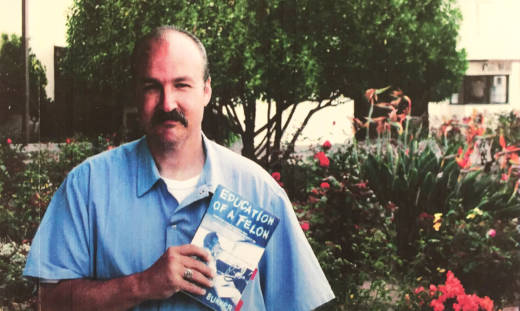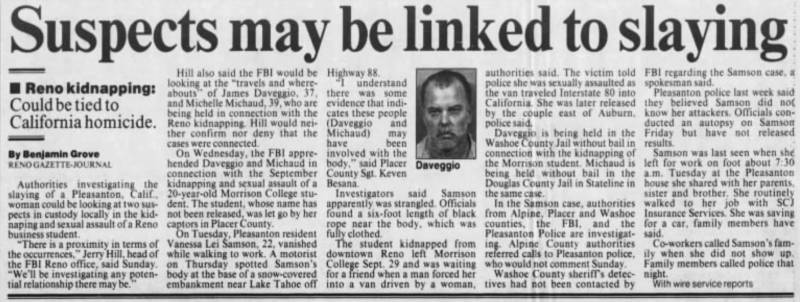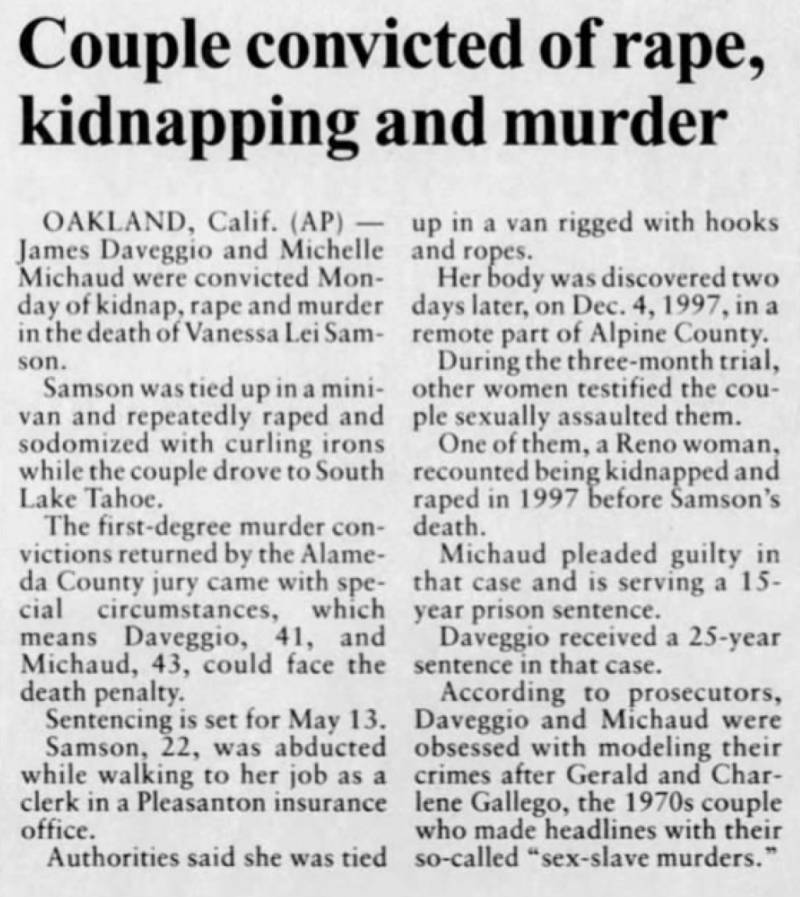But five month's later, then-Gov. Arnold Schwarzenegger reversed the parole board's decision. Schwarzenegger's June 9, 2006, reversal of Marvin Mutch's parole is transcribed below for legibility. Read the original copy here.
INDETERMINATE SENTENCE PAROLE RELEASE REVIEW
(Penal Code Section 3041.2)
MARVIN MUTCH, B-65921
FIRST-DEGREE MURDER
AFFIRM: __________________
MODIFY: __________________
REVERSE: ________X_________
On September 24, 1974, Marvin Mutch drowned to death 13-year-old Cassie Riley in a creek.
According to the probation report, Ms. Riley was leaving a convenience store when Mr. Mutch, an acquaintance, who was coming out of a nearby creek area, called to her. After Ms. Riley walked over to Mr. Mutch and spoke briefly with him, the two walked down to the creek area. Mr. Mutch was seen leaving the area in his car approximately 30 minutes later. The following morning, Mrs. Riley was found dead near the creek. Evidence at the scene indicated that a struggle had taken place; there was a large area of trampled foliage. Ms. Riley died from asphyxiation caused by drowning, and her body showed many marks indicating a struggle. After she was drowned, Ms. Riley was dragged from the creek to the bank, her shirt and bra were raised up around her neck, her pants were pulled down around her ankles, her underpants were torn off and discarded nearby, and she was placed in a sexual position.
Mr. Mutch was arrested approximately two weeks later. Following a jury trial, he was found guilty of first-degree murder and sentenced to an indeterminate term of life with the possibility of parole.
When he perpetrated this crime, Mr. Mutch was 18 years old, and had already amassed an extensive juvenile record, including adjudications for battery, petty theft, truancy, being beyond the control of school officials, being a runaway, breaking lights in a church, physically attacking his mother, and loitering. Since his incarceration for the life offense, Mr. Mutch has accumulated an astounding 38 rules violations -- several of which were for exhibiting violent behavior. His violations included fighting, threatening another inmate, theft of state property, inciting others, disrespect towards (sic) staff, possession of an inmate manufactured syringe, control of narcotic paraphernalia, gambling, misuse of state property, threatening staff with force and violence, and stimulants and sedatives, in addition to many others. Mr. Mutch has also been counseled 27 times for minor misconduct, most recently in 2005. In light of Mr. Mutch's extensive juvenile record, his continued inability or unwillingness to live within the rules of his environment as an adult -- particularly given the assaultive and violent nature of much of his conduct -- weighs heavily against his parole suitability.
To his credit, Mr. Mutch has made efforts during his incarceration to enhance his ability to function within the law upon release. He earned his GED in 1982, and has taken several college courses. He has completed vocational computer refurbishing and X-Ray, has earned a certificate in Computer Refurbishing, and has held institutional jobs in Administrative Segregation, the Infirmary, Pre-release academics, Maintenance Plumbing, Dining Room, Clothing Distribution, and Wash Deck, and as Men's Advisory Council Chairman, Library Clerk, Video Production Coordinator, Videotape Librarian, PIA Furniture Assembler, Tool Room tech/Teachers Aid, Assignment Office Clerk, Corridor Janitor, Hazmat/Computer Clerk, Printing Plant Inspector General, PIA Sergeant's Clerk, and Accounting Clerk. He has also availed himself of an array of self-help and therapy, including 40 individual therapy sessions since 2001, Centerforce, Dream Therapy, Alternatives to Violence, Anger Control Group, Criminal Thinking Group, Psychological Research Project, Rational Behavior Training Group, Reality and Decision Making Group, Advanced Stress Management and Relaxation Training, Peer Training Program, Group Psychotherapy in addition to other group therapy, and has taken part in extracurricular activities. All of these factors are supportive of Mr. Mutch's release from prison to parole at this time.
Mr. Mutch has maintained seemingly solid relationships and close ties with supportive family and friends, and has made parole plans that include living with his wife in Sacramento County. Although Mr. Mutch does not have a confirmed job offer in the area, he has marketable skills in computer repair.
Notwithstanding the positive factors supporting parole, the first-degree murder perpetrated by Mr. Mutch was especially heinous, due, in part, to the fact that Ms. Riley was particularly vulnerable. According to the probation report, Mr. Mutch called to Ms. Riley, who had just come out of a store where she had gone to purchase some candy. After they walked to the creek together, a struggle ensued between them, and Mr. Mutch drowned Ms. Riley in the creek. He then dragged her lifeless body onto the bank, undressed her, tore of her underpants, and positioned her in a sexual manner. Needless to say, the nature and circumstances of the first-degree murder perpetrated by Mr. Mutch would alone be sufficient for me to conclude presently that his release from prison would pose an unreasonable public-safety risk. The Alameda County District Attorney's Office agrees -- registering opposition to the Board regarding Mr. Mutch's parole based on the gravity of the crime he committed.
Mr. Mutch presently claims he is innocent of Ms. Riley's murder; the same claim he made to investigating officers in 1974. I note, however, that for approximately 20 years, until 2001, Mr. Mutch stated that he was, in fact, a participant in Ms. Riley's death. According to his 1980 mental-health evaluation, Mr. Mutch claimed that, around the time of the murder, he was involved with a youth group affiliated with the Ku Klux Klan. The night of the murder, Mr. Mutch contacted Ms. Riley and brought her into the creek area, where she was physically abused and dunked in the creek by other members of the youth group. After Ms. Riley drowned as a result of the dunking, the group positioned her body on the bank of the creek in a manner indicating that she had been a victim of a sexual assault, similar to other sexual assaults that had occurred in the community at that time. Approximately 20 years later, shortly after the publication of a book about Ms. Riley's murder, in which the author theorized, according to Mr. Mutch's attorney at the 2006 parole hearing, that another person committed Ms. Riley's murder, Mr. Mutch recanted his story, claiming again that he was innocent of her murder. Although Mr. Mutch need not change his story to be found suitable for parole, I need not accept it as true. Coupled with the fact that Mr. Mutch was found to be "a moderate risk for recidivism" if he were released to the community in his most recent mental-health evaluation, I continue to harbor great public safety concerns regarding his release on parole.
Now age 49, after being incarcerated more than 31 years, Mr. Mutch has made some encouraging gains. But given the record before me, and after carefully considering the very same factors the Board must consider, I find that the negative factors weighing against Mr. Mutch's parole suitability presently outweigh those tending to support it. Accordingly, because I believe his release would pose an unreasonable risk of danger to society at this time, I REVERSE the Board's 2006 decision to grant parole to Mr. Mutch.
Decision Date: 6/9/2006
ARNOLD SCHWARZENEGGER
Governor, State of California



